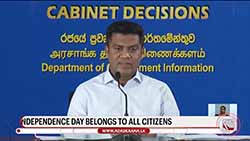Now UK MPs sign anti-Kudankulam letter to Indian Premier
May 17, 2012 10:29 pm
With pressure by the United States mounting on India to cut down on its fuel imports from Iran due to the economic sanctions, its alternative power source, the nuclear power plant at Kudankulam too is coming under increasing pressure from other sources.
According to Indian media reports, apart from anti-nuclear and environmental groups British and European Union members of parliament have joined the protests.
British MPs and members of the European Parliament have signed a letter from south Asian anti-nuclear groups to Indian Prime Minister Manmohan Singh expressing “deep concern” over human rights and environmental issues around the controversial Kudankulam Nuclear Power Project (KKNPP), which they argue “violates” the International Atomic Energy Agency’s safety guidelines.
The letter, to be handed to the Indian High Commission after a protest planned outside India House on Friday, also demands withdrawal of police and court cases against anti-KKNPP protesters accusing the security forces of “intimidation” and “harassment”, reports Hasan Suroor writing for The Hindu of India.
“Non-violent protesters are being intimidated, harassed, imprisoned, and falsely charged. We understand that from one police station alone, charges have been brought against more than 50,000 people including about 6,500 for sedition and ‘war against the state’ in the last eight months,” it says.
Signatories include Labour MPs Jeremy Corbyn and John McDonnell; the Green Party’s Caroline Lucas and its MEP Keith Taylor; and Kate Hudson of the Campaign for Nuclear Disarmament.
A spokesperson of the South Asia Solidarity Group said more MPs were expected to sign the letter, a copy of which would also be sent to Tamil Nadu Chief Minister Jayalalithaa.
Calling for a “halt” to the project, the letter says it is a safety hazard as it is located in “a tsunami and earthquake-prone region”.
“It is also in violation of the mandatory requirement for construction of fresh water reservoirs which are essential in case of a nuclear accident. This is significant, because fresh water is the only remedy in the event of a nuclear emergency. The primary cause for all major accidents such as at Three Mile Island, Chernobyl and Fukushima was lack of fresh water,” it says.
It demands that that all reports, reviews and information related to the nuclear plant be “made transparent and accessible to the public”.
The signatories say that they “fully appreciate” India’s energy needs but argue that security considerations cannot be brushed aside.
“We implore that alternative measures be investigated and invested in, rather than resorting to nuclear power plants in ecologically unsound circumstances,” they say, according to the report.
Caption: The two reactors of the Kudankulam Nuclear Power Plant, courtesy The Hindu/Press Trust of India












